The Living Stone and His Chosen Nation
Comments for Study 2
Pick to read this Bible passage in a separate window.
I. The Living Stone and His Chosen Nation (2:4-12)
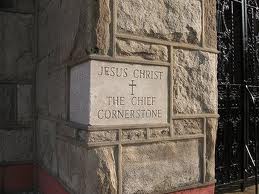
>1. Comparing verse 4 with Jesus' words in Matthew 21:42-46, how did Peter grow to understand that Jesus was predicting that simple Jewish fisherman and Gentiles would accept the gospel?
* 1 Peter 2:4 "As you come to him, the living Stone--rejected by men but chosen by God and precious to him"
* Matthew 21:42-46 "Jesus said to them, "Have you never read in the Scriptures: "'The stone the builders rejected has become the capstone; the Lord has done this, and it is marvellous in our eyes'? "Therefore I tell you that the kingdom of God will be taken away from you and given to a people who will produce its fruit. He who falls on this stone will be broken to pieces, but he on whom it falls will be crushed." When the chief priests and the Pharisees heard Jesus' parables, they knew he was talking about them. They looked for a way to arrest him, but they were afraid of the crowd because the people held that he was a prophet."
* "rejected by men" -The Jewish religious and Jewish and Gentile political leaders of Jesus' time rejected him. However, the uneducated average Jewish person was amazed at Jesus' words and/or miracles. After Jesus' ascension some Jews accepted that he was the Messiah. However, in far greater numbers Gentiles accepted Jesus as their Savior and Lord.
* "chosen by God and precious to him" -God the Father claimed that he loved Jesus. Jesus was and still is the only human who fully obeyed God. Jesus, even before he became God-in-the-flesh fully obeyed God.
* Today is no different than when Jesus walked the earth. Today many rich and powerful people reject Jesus because they love the things of this world. Today common lowly people accept Jesus as their Savior and Lord.
* Review those you personally know who are true believers, those who pretend to believe, and those who have rejected Jesus so far. What status in this life do they have?
>What can we learn about what it means to believe in Jesus?
* "As you come to him" -Through faith we come to Jesus. Have you come to Jesus? Have you put your trust in him? Have you repented of your sins and selfish ways? Do you live for Jesus and his church? Have you truly come to Jesus? Do you go to him every day? If not, what are you waiting for?
* "the living Stone" -Peter is the only Biblical author to call Jesus the Living Stone. Perhaps Peter remembered that Jesus gave him a name that means small rock (Cephas in Aramaic and Peter in Greek). (John 1:42) Peter also may have been thinking of what Jesus said when he confessed that Jesus was the Messiah. (Matthew 16:17) Peter also calls Jesus the cornerstone in verse 6. Jesus, the cornerstone is used by Isaiah 28:16 and Zechariah 10:4 to describe the Messiah.
Psalm 118:22 and Isaiah 8:13-15 calls Jesus the capstone. Paul quotes Isaiah 8 in Romans 9:33 to back up the point that Israel who tried to gain righteousness by works did not obtain it, but the Gentiles did obtain it because they had faith in Jesus, the stone.
Jesus quoted Psalm 118 when teaching that it was predicted that he would be rejected by the religious leaders. (Matthew 21:42; Mark 12:10; Luke 20:17) He concluded by saying, "He who falls on this stone will be broken to prieces, but he on whom it falls will be crushed." (Matthew 21:44)
Jesus is a living stone because he is life and he gives and sustains life. (John 1:4, 5:26) Peter may have also been thinking of Zechariah 3:8-10. These verses portrays the Messiah as a stone that has living water flowing from him and that stone will take away sin in a single day. And the water from it will cause a great Branch to grow into a large vine and tree.
* Isaiah 28:16 "So this is what the Sovereign LORD says: "See, I lay a stone in Zion, a tested stone, a precious cornerstone for a sure foundation; the one who trusts will never be dismayed."
* Zechariah 3:9 "See, the stone I have set in front of Joshua! There are seven eyes (facets) on that one stone, and I will engrave an inscription on it,' says the LORD Almighty, 'and I will remove the sin of this land in a single day."
* Zechariah 10:4 "From Judah will come the cornerstone, from him the tent peg, from him the battle bow, from him every ruler."
* When we are presented with the truth of Jesus we need to accept it.
* Peter states on Pentecost, "He is "'the stone you builders rejected, which has become the capstone'." (Acts 4:11)
* Daniel 2:34-35 "While you were watching, a rock was cut out, but not by human hands. It struck the statue on its feet of iron and clay and smashed them. Then the iron, the clay, the bronze, the silver and the gold were broken to pieces at the same time and became like chaff on a threshing floor in the summer. The wind swept them away without leaving a trace. But the rock that struck the statue became a huge mountain and filled the whole earth."
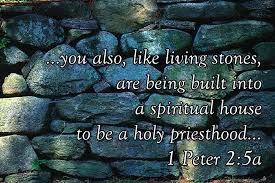
>How does verse 5 add to this understanding?
* 1 Peter 2:5 "you also, like living stones, are being built into a spiritual house to be a holy priesthood, offering spiritual sacrifices acceptable to God through Jesus Christ."
* "you also" -The people Peter was writing to are Christians; both Jews and Gentiles.
* "like living stones" -Elsewhere in the Bible people are described as stone. Israel was represented by twelve stones in Exodus 39:6-21 and Joshua 4:1-21. Those who believe in Jesus as the Messiah are not just stones, we are living stones. We were as dead as a stone, but Jesus, the life giving spirit (1 Corinthians 15:45) gave us life.
Christians are also called the temple of God, each one a living stone in the building, the spiritual church. Ephesians 2:19-22 states, "Consequently, you are no longer foreigners and aliens, but fellow citizens with God's people and members of God's household, built on the foundation of the apostles and prophets, with Christ Jesus himself as the chief cornerstone. In him the whole building is joined together and rises to become a holy temple in the Lord. And in him you too are being built together to become a dwelling in which God lives by his Spirit." Paul also uses the illustration that Jesus' church is a temple of God in 1 Corinthians 3:10-17.
The Lord God gave Israel a tabernacle, a place to meet and worship God as they traveled in the desert. Then when they entered the promised land the tabernacle was replaced by a physical building, first in Shiloh and then in Jerusalem. When God's people no longer used the physical temples to meet God and worship him in the way he ordained, the Lord God Almighty tore the temples down. Then the Lord Jesus sent the Holy Spirit into every believer. So the temple in Jerusalem was no longer needed and torn down in 70 A.D. Now all true believers are priests in a spiritual temple. Now all true believers are living stones in the spiritual temple of God.
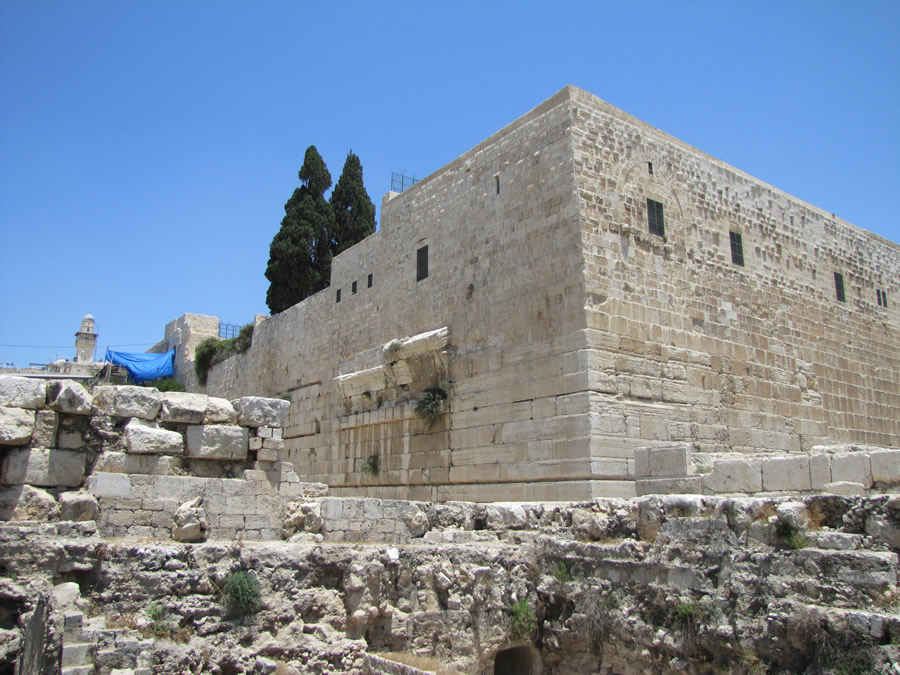
* See two pictures to the right of part of the Temple Mount from Jesus' time that still exists to this day. This is the south-west corner of the Temple Mount. The remains of where Robinson's Arch made contact with the Western Wall can still be seen. An entrance gate to the platform where the temple and temple courts existed would have been directly above this. Benjamin Mazar excavated this area after 1967. Before that time the ground level was up to Robinson's Arch so that a person could walk up and touch it. The excavation in the lower picture contains (from left to right):
1) The square openings of shops that were under Robinson's Arch
2) The remains of the piers that supported the arch and the staircase
3) Steps at the base of the Temple Mount corner that led up to a pavement which ran over the top of the shops that sat under Robinson's Arch.
4) Located just to the left of those steps are the remains of walls (3 or 4) from the shops that were perpendicular to and butted up against the west wall (facing the camera),
5) The pavement and steps that ran along the south (right) side of the Temple Mount
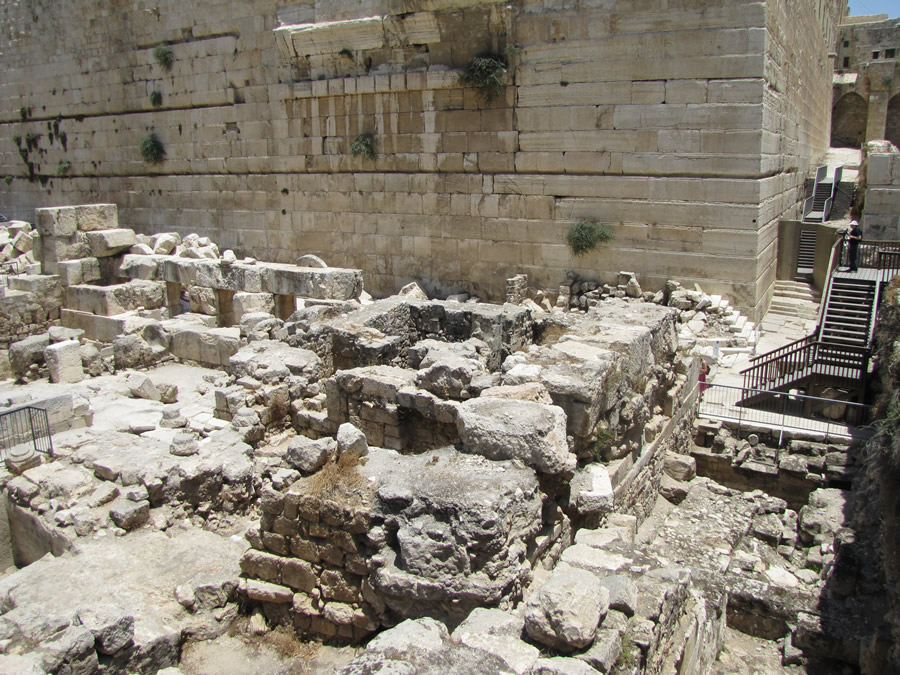 The arch, the spring, and all the stones in the wall below the arch are original from the Days of Herod's construction, which began in 19 BC. The arch, the staircase, and the gate were in use in the days of Jesus when he spent time on the Temple Mount.
The arch, the spring, and all the stones in the wall below the arch are original from the Days of Herod's construction, which began in 19 BC. The arch, the staircase, and the gate were in use in the days of Jesus when he spent time on the Temple Mount.
* "are being built into a spiritual house" -Peter is not talking about a physical building, denomination, or an organization. Rather, since God dwells in every believer we are all apart of God. Continually God acts in us. Continually God adds new members to his house. In many places and many ways God tells us in the Bible that we are a part of God; we are a unit, a joined work of God. When Jesus told his disciples during the last supper, "Do not let your hearts be troubled. Trust in God; trust also in me. In my Father's house are many rooms; if it were not so, I would have told you. I am going there to prepare a place for you. And if I go and prepare a place for you, I will come back and take you to be with me that you also may be where I am. You know the way to the place where I am going," (John 14:1-4) he was not merely talking about a physical building as many have come to understand it. Rather, he is speaking about a spiritual place in God himself. Elsewhere Paul uses the human body to portray the same idea. (Romans 8:11; and 1 Corinthians 6:15, 10:16, 12:12-30; Galatians 2:20; Ephesians 3:6, 4:12, 5:23)
* "to be a holy priesthood" -God instituted a priesthood for Israel from the tribe of Levi. (Exodus 29:9, 40:15; Numbers 18:7, 25:13) They were to minister before the Lord on behalf of their fellow Israelites. All Israel was to be like priests to the rest of the nations in that they were to bring the word of the Lord to the world. Now those who call on the name of Jesus are priests. Isaiah 61:6 says that in the day of the Lord's favor, when Jesus comes again we "will be called priest of the Lord... ministers of our God." We are sent to bring the gospel to the whole world.
* "offering spiritual sacrifices acceptable to God through Jesus Christ" -We are to offer our bodies, our lives as spiritual sacrifices. (Romans 12:1) Our bodies, our lives, are to be sacrificed as we bring the gospel to the world. We are to serve our brother and sisters in Christ.
* Peter must have grown to understand what Jesus was saying to him when he told him, "And I tell you that you are Peter, and on this rock I will build my church, and the gates of Hades will not overcome it." (Matthew 16:18)
* One quality belonging to the Holy Spirit, of great interest and importance to every seeking heart, is penetrability. He can penetrate matter, such as the human body; He can penetrate mind; He can penetrate another spirit such as the human spirit. He can achieve complete penetration of and actual inter-mingling with the human spirit. He can invade the human heart and make room for Himself without expelling anything essentially human. The integrity of the human personality remains unimpaired. Only moral evil is forced to withdraw. (Gems from Tozer & The Divine Conquest)
* When God infuses eternal life into the spirit of a man, the man becomes a member of a new and higher order of being. (Gems from Tozer & The Knowledge of the Holy Spirit)
* Priests:
1) Reflect the holiness of God (Hebrews 7:26, 10:10)
2) Offer spiritual sacrifices
3) Pray for others
4) Represent God to others (NIV Study Bible)
>2. What does "never be put to shame" mean? (6)
* 1 Peter 2:6 "For in Scripture it says: 'See, I lay a stone in Zion, a chosen and precious cornerstone, and the one who trusts in him will never be put to shame.'"
* "never be put to shame" -God will never put to shame those who trust in Jesus. The world will mock and persecute us because we are not like them. We do not do what they do and we do not approve of it. So they put us to shame. Their evil actions towards true Christians is growing in intensity and frequency. However, when Jesus comes to judge the world, all those who trust in him will not be put to shame.
* Matthew 10:32-33 "Whoever acknowledges me before men, I will also acknowledge him before my Father in heaven. But whoever disowns me before men, I will disown him before my Father in heaven."
* Revelation 3:5-6 "He who overcomes will, like them, be dressed in white. I will never blot out his name from the book of life, but will acknowledge his name before my Father and his angels. He who has an ear, let him hear what the Spirit says to the churches."
* "cornerstone" -Jesus is described as the cornerstone here and elsewhere in the Bible. The cornerstone is the first laid and most important stone in a building. From it all the other stones line up. The cornerstone supports the weight of the stones on it. All other blocks are laid in relation to the cornerstone. Take away the cornerstone and the whole building comes down. Jesus' life and ministry; his death and resurrection is the cornerstone of salvation for all men.
>What is the message the religious leaders in Jesus' day rejected and we must believe? (7-8)
* 1 Peter 2:7-8 "Now to you who believe, this stone is precious. But to those who do not believe, "The stone the builders rejected has become the capstone, and, "A stone that causes men to stumble and a rock that makes them fall." They stumble because they disobey the message--which is also what they were destined for."
* "capstone" -A capstone is the top stone of a structure or wall. The stone at the top of an arch is called a capstone.
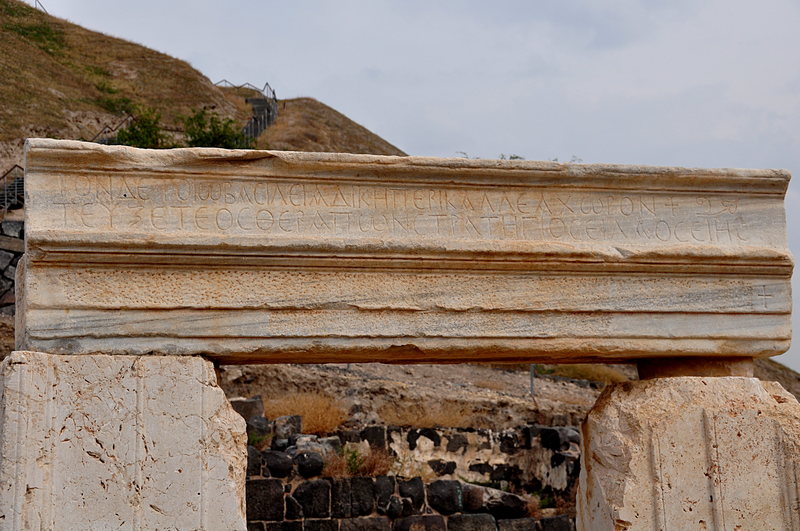
See a picture of a Greek capstone to the right.
* "Now to you who believe" -Peter is writing the Christians, both Jews and Gentiles who accepted Jesus as their Savior and Lord.
* "this stone is precious" -The words of love and affection. Do you love Jesus? Do you find him precious? Is he highly esteemed in you eye? Do you cherish him? Is Jesus dear to you?
* "those who do not believe" -Peter is thinking of all the people he saw reject Jesus as the Messiah, they included the rich, the powerful, and the religious among the Jews.
* "They stumble because they disobey the message" -When people came into contact with Jesus they had to make a decision; would they accept him as the Messiah. If they did then they were required to obey him. When a rich young man came to Jesus he was proud to claim he kept all the laws. However, when Jesus told him to sell all he had, give it to the pour, and then follow him; the man did not obey Jesus. The man did not and would not enter the kingdom of God. (Mark 10:20-23) Are you obeying Jesus? Do you claim to be a follower of Jesus and yet do not follow his way. Jesus said, "Why do you call me, 'Lord, Lord,' and do not do what I say? I will show you what he is like who comes to me and hears my words and puts them into practice. He is like a man building a house, who dug down deep and laid the foundation on rock. When a flood came, the torrent struck that house but could not shake it, because it was well built. But the one who hears my words and does not put them into practice is like a man who built a house on the ground without a foundation. The moment the torrent struck that house, it collapsed and its destruction was complete." (Luke 6:46-49)
* "which is also what they were destined for" -Some see here an indication that some people are destined to fall and be lost. Others say that unbelievers are destined to be lost because God in his foreknowledge saw them as unbelievers. Still others hold that Peter means that unbelief is destined to result in eternal destruction. (NIV Study Bible)
>Why might Peter want to teach about stones? (Matt. 16:17-18)
* Matthew 16:16-18 "Simon Peter answered, 'You are the Christ, the Son of the living God." Jesus replied, 'Blessed are you, Simon son of Jonah, for this was not revealed to you by man, but by my Father in heaven. And I tell you that you are Peter, and on this rock I will build my church, and the gates of Hades will not overcome it.'"
* As stated above Peter learned from Jesus, particularly remembering the day that God revealed to him and he confessed that Jesus was the Christ. Perhaps there was a misconception about Peter's importance in the church. If so then Peter here is directing people's attention back to Jesus. Throughout church history to much emphasis is placed on this man or that man in regard to the affairs of the church. A long time ago I was in a denomination that some placed to much emphasis on the pope. After that I was in another group that placed to much power and authority in another man. In doing so both men became wealthy at the sacrifice of many they claimed to serve and yet never admitted to it. Take it from Peter here, Jesus is in charge of his church not any person. A congregation should never give to much power to one person. Power corrupts and absolute power corrupts absolutely.
>3. What does the four descriptions in 9a mean?
* 1 Peter 2:9a "But you are a chosen people, a royal priesthood, a holy nation, a people belonging to God"
* "you are" -Peter is addressing this to those who find Jesus precious, the living stones, the holy priesthood.
* "a chosen people" -God chooses us first. We do not chose him first. We then can chose to accept or reject him. People is a plural word not meaning just one person or group of people. We are many. God's chosen must meet together regularly because we are a people, a functioning unit.
* "a royal priesthood" -The nation of Israel was to be a priesthood. However, when they sinned with the two golden calves, the tribe of Levi became God's priesthood for all Israel. When the high priest rejected Jesus, God made a new priesthood. This one is different than the Old Testament priesthood. It is a royal priesthood. The royal priesthood of the church age was prophesied by Zechariah. Zechariah 6:9-13 states, "The word of the LORD came to me: "Take [silver and gold] from the exiles Heldai, Tobijah and Jedaiah, who have arrived from Babylon. Go the same day to the house of Josiah son of Zephaniah. Take the silver and gold and make a crown, and set it on the head of the high priest, Joshua son of Jehozadak. Tell him this is what the LORD Almighty says: 'Here is the man whose name is the Branch, and he will branch out from his place and build the temple of the LORD. It is he who will build the temple of the LORD, and he will be clothed with majesty and will sit and rule on his throne. And he will be a priest on his throne. And there will be harmony between the two.'" Jesus is the royal high priest. For more on this see Hebrews 7 to 10.
* "a holy nation" -The church consisting of both Jews and Gentiles are the holy nation of God. Israel was God's chosen nation. He consecrated them, set them apart. They sinned at the mountain and continued to sin. Jesus died to cleans his people of their sins and so now we are holy nation. We need to be holy in order to meet a holy God.
* Chapter 9, We Cannot Understand Holiness I suppose the hardest thing about God to comprehend intellectually is His infinitude. But you can talk about the infinitude of God and not feel yourself a worm. But when you talk about the holiness of God, you have not only the problem of an intellectual grasp, but also a sense of personal vileness, which is almost too much to bear.
The reason for this is that we are fallen beings spiritually, morally, mentally and physically. We are fallen in all the ways that man can fall. Each one of us is born into a tainted world, and we learn impurity from our cradles. We nurse it in with our mother's milk, we breathe it in the very air. Our education deepens it and our experience confirms it evil impurities everywhere. Everything is dirty; even our whitest white is dingy gray. (Tozer; The Attributes of God – Volume 1: A Journey into the Father's Heart)
* "a people belonging to God" -We belong to God because we were bought out of slavery (redeemed) through the blood of Jesus. (Exodus 6:6; and 1 Peter 1:18-19)
* Recent generations have had groups of people step forward who claim to be the "ten lost tribes". What do they expect to gain that can't be gained by accepting Jesus as their personal Savior and Lord? Yes, the Lord called Israel (all twelve tribes) his chosen nation and his elect people. Well, right here the Lord is claiming that Christians are his chosen nation and his elect people. Since this is true, what is gained by being one of the "lost ten tribes of Israel"?

>Why did God give us these status'? (9b)
* 1 Peter 2:9b "that you may declare the praises of him who called you out of darkness into his wonderful light."
* Declaring praises is proclaiming who he is and the good works he has done. We sing it in churches. We say it in our homes, places of work, school, and in the shopping mall. We tell others how great our God Jesus is. We tell them the good news of his saving work. We are enthusiastic when we speak of the glory to come. We tell of who he is to us and what he did and will do for us.
* "darkness" -When we are in the dark we cannot see anything. We don't know where we are and where we are going. If we try to go somewhere he run into things and fall. Darkness brings vague fears and doubt. Darkness makes us feel small and helpless. Darkness is cold and empty. Darkness brings despair and death. Darkness is not the color black. Darkness is the absence of light whereas the color black absorbs all light.
* Darkness represents evil and sin in sinful man. It represents life without Jesus, the light. If a person was born and raised in darkness, in a cave all their lives, they would have no comprehension of light. Spiritually people do not know they are in darkness of sin and do not know anything about God.
* "For although they knew God, they neither glorified him as God nor gave thanks to him, but their thinking became futile and their foolish hearts were darkened." (Romans 1:21)
* "Furthermore, since they did not think it worthwhile to retain the knowledge of God, he gave them over to a depraved mind, to do what ought not to be done." (Romans 1:28)
* "For God does speak--now one way, now another-- though man may not perceive it." (Job 33:14)
* Light and darkness are completely opposite. Light always expels darkness. When Jesus comes into a person's heart he expels the darkness.
* "light" -Light is self evidencing. Lighting in a dark room enables us to see everything. We know where we are and where we need to go. When we go to our destination we can avoid all obstacles and pitfalls. Light cast our all fears and doubt. Light gives us life and empowerment. Light brings warmth and enables life to flourish.
* Light and life are interchangeable in the New Testament. The symbolism of light and darkness is often used in the New Testament.
* John 1:4-5 "In him was life, and that life was the light of men. The light shines in the darkness, but the darkness has not understood it."
* Jesus is sometimes referred to as light. John 1:9 states, "The true light that gives light to every man was coming into the world." Jesus himself said, "When Jesus spoke again to the people, he said, 'I am the light of the world. Whoever follows me will never walk in darkness, but will have the light of life.'" (John 8:12)
* "'I have come into the world as a light, so that no one who believes in me should stay in darkness.'" (John 12:46)
* "This is the message we have heard from him and declare to you: God is light; in him there is no darkness at all." (1 John 1:5)
>What should we always remember about our status? (10)
* 1 Peter 2:10 "Once you were not a people, but now you are the people of God; once you had not received mercy, but now you have received mercy."
* "Once you were not a people" -People here references a nation from the same ancestors. Jesus brings together people who had different ancestors, or ancestors so far back it should be considered so. Peter was writing to congregations that were made up of Greeks, Romans, and Jews. Even those who outsiders considered Greeks were actually a combination of people who migrated to the area Peter was writing to. The congregations were not a people, but have been made a people.
* "now you are the people of God" -The general church of God is made up of all races; black, white, Hispanic, north American Indian, Arabic, and Asian. I have meet and consider people from all these races as my friends and brothers.
* "once you had not received mercy" -Mercy covers misery. God gives mercy to his children. When a person is not in the family of God we did not receive mercy.
* "now you have received mercy" -Peter wrote this letter because the congregations were experiencing the persecutions caused by Nero. Some were arrested, jailed, and even killed. Though their physical reality for some could be described as misery, spiritually they received mercy through Jesus Christ.
>4. How are we aliens and strangers in the world?
* 1 Peter 2:11a "Dear friends, I urge you, as aliens and strangers in the world, to abstain from sinful desires"
* "Dear friends" -Peter considered them friends.
* "as aliens and strangers in the world" -Though we are in the world we are not engaging in its activities.
* "abstain from sinful desires" -We follow Jesus' pure way of life. We have a choice to make; resist the sinful desires in us or surrender to them.

>Who is our combatant in the spiritual war?
* 1 Peter 2:11b-12 "which war against your soul."
* The spiritual battle is within. The spiritual battle is in our soul. The spiritual battle is against our sinful nature. The spiritual battle is to resist the sinful desires in our sinful nature.
* Young children say, "The devil made me do it." What a lie! The truth is that when I was tempted, I decided to submit to the sinful desires of my heart. To many times I hear Christians blame others including the devil for "evil thoughts" in their heads. The devil does not communicate to a Christian's brain, at least I see nowhere in the Bible that teaches that. How can he if the Holy Spirit dwells in all Christians? Rather, many passages like this one here states that we have a sinful nature (natural tendency) to follow the sinful desires in our heart. When you sin, own up to it admitting your are the only one guilty of this sin and ask for forgiveness. Saying, "The devil made me do it," is saying, "I am innocent of this," which is a lie. Saying, "That thought comes from the devil," is saying, "I am unable to think these kinds of sins," which is a lie. It is true that Jesus said to Peter, "Get behind me Satan." However, he was not saying Peter was Satan, or that Satan possessed him. Just as when Peter confessed that Jesus was the Christ moments before, he was not saying Peter was God; but rather God opened his spiritually blind heart. When Peter tried to talk Jesus out of the cross Jesus was saying, "You are a stumbling block to me; you do not have in mind the things of God, but the things of men." (Matthew 16:33; Mark 8:33) The sinful desires of the heart are in league with the devil's desires so that fallen man can be called sons of the devil. (John 8:44)
* Are you following the sinful desires of your heart, or following the desires of God?
* Do you resist the sinful desires of your heart, or are you following the desires of the devil?
>5. Regardless of what people say about our faith now, what will they say when Jesus comes? (12)
* 1 Peter 2:12 "Live such good lives among the pagans that, though they accuse you of doing wrong, they may see your good deeds and glorify God on the day he visits us."
* "pagans" -A general definition of a pagan is one who does not have a religion. However, Peter is referring to one who does not have a personal relationship with Jesus. Pagans are those who worship a god or gods other than the living God to whom the Bible witnesses. NIV, REB, and RSV sometimes use pagans as the translation of the Greek "ethnoi" (1 Corinthians 5:1, 10:20; 1 Peter 2:12), which is generally translated Gentiles (so KJV, NAS). In English, Gentile relates to ethnic background while pagan refers to religious affiliation.
* "they accuse you of doing wrong" -Sinful mankind wants to be accepted and they want to feel good about themselves. Sinful man has a hard time accepting that their is something fundamentally wrong with their heart. They say, "I'm OK," even though they may be in a jail cell convicted of rape, murder, stealing, or some other horrible crime. So they gather around themselves people who agree with them and tell them, "Your great." Opposite of this are Christians who hold to the truth that we are all sinners and have the sinful nature. In order to be accepted by God and righteous in his sight we need for confess our sins and ask for forgiveness in Jesus' name. These two belief systems are fundamentally opposite. Jesus tell his people to love our neighbors and enemies (those who wrong us). Our enemies hate us and accuse of of wrong, whether we've done wrong or not. Why? In doing so they believe in doing so they will feel good about themselves saying, "They are wrong and I am right."
* "they may see your good deeds" -Christians are to do good deeds. Jesus told us that we are not to advertise a good deed as the Pharisees did. We are not to do good deeds for personal profit. We are not to seek approval when we do good. Yet, sometimes others will see our good deeds. This can't always be avoided.
* "glorify God on the day he visits us" -Unbelievers may accuse Christians of doing wrong now. However, a day will come when they will have to admit the truth.
* "on the day he visits us" -The original Greek here is "hemera episkope". "Hemera" literally means the time space between dawn and dark, or the whole twenty-four hours (but several days were usually reckoned by the Jews as inclusive of the parts of both extremes) and figuratively as a period that is further defined by the context of the surrounding phrases. So here Peter uses "hemera" referring to Jesus visitation as one period of time between one literal dawn and the darkness of night that follows the dawn. Jesus will come again to visit us one day and stay. Peter does not imply in any way that Jesus will come one day to gather his elect, leave, and then seven years later come on another day to judge the nations as many modern day rapture teachers proclaim. "Episkope" is translated visits and visitation.

* Many times in my life I have been falsely accuse of doing wrong. Being falsely accused by unbelievers is hard to bear. However, I have also been falsely accused by religious people, those who go belong to a congregation. This is much harder to endure. Many years ago when I was in my twenties I attended a group where its leaders over me were always backstabbing and arguing with each other trying to gain power and prominence. When the leadership in the local congregation I attended changed through an arranged scandal the man who plotted the scandal ended up in the leadership position. I was only a layman. Yet this man saw me as a threat to his new position. So he constantly reported falsely to his supreme leader all kinds of things about me. The supreme leader saw through his lies and rebuked him for it. Still the false accusations persisted. During this hard to endure time I remembered how Joseph, Daniel, Jeremiah, Jesus, and the apostles endured false accusations and lies. Even though these men were wrongly thrown into jail, lion dens, flogged, and crucified they endured because they believed their God was with them and someday He would proclaim the truth. Remember as you endure false accusations that someday the truth about your life will be revealed.
II. How to Use Our Freedom (2:13-24)

>6. Are there any restrictions to submitting to authorities instituted by men? (13-14)
* 1 Peter 2:13-14 "Submit yourselves for the Lord's sake to every authority instituted among men: whether to the king, as the supreme authority, or to governors, who are sent by him to punish those who do wrong and to commend those who do right."
* "every" -All people have someone they submit to, often many people. Peter does not make a distinction if these authorities are believer or not, nor if they have evil intent or not.
* Peter and Jame were arrested by the Jewish religious leaders for proclaiming Jesus' name. He did not resist. He submitted to their leadership even though they had rejected Jesus as their Messiah.
>Why should we?
* "for the Lord's sake" -When and if people who call themselves Christians and followers of Jesus resist the civil authority they give the Lord's name a back image.
* Mark 12:17 "Then Jesus said to them, "Give to Caesar what is Caesar's and to God what is God's." And they were amazed at him."
* Acts 4:18-20 "Then they called them in again and commanded them not to speak or teach at all in the name of Jesus. But Peter and John replied, "Judge for yourselves whether it is right in God's sight to obey you rather than God. For we cannot help speaking about what we have seen and heard."
>What does it mean to submit ourselves?
* "Submit yourselves" -Recognize their authority.
* Romans 13:1-5 "Everyone must submit himself to the governing authorities, for there is no authority except that which God has established. The authorities that exist have been established by God. Consequently, he who rebels against the authority is rebelling against what God has instituted, and those who do so will bring judgment on themselves. For rulers hold no terror for those who do right, but for those who do wrong. Do you want to be free from fear of the one in authority? Then do what is right and he will commend you. For he is God's servant to do you good. But if you do wrong, be afraid, for he does not bear the sword for nothing. He is God's servant, an agent of wrath to bring punishment on the wrongdoer. Therefore, it is necessary to submit to the authorities, not only because of possible punishment but also because of conscience."
* Ephesians 5:21 "Submit to one another out of reverence for Christ."
* Hebrews 13:17 "Obey your leaders and submit to their authority. They keep watch over you as men who must give an account. Obey them so that their work will be a joy, not a burden, for that would be of no advantage to you."
>Who establishes them and why?
* "who are sent by him" -Peter is referring to the king not to God as the sender.
* Governors act under the king's authority as an extension of his power and domain.
* "to punish those who do wrong and to commend those who do right" -If a Christian breaks the civil law he should expect to be punished even though the law that was broken was against the law of God or not.
* If you are in a place where obeying God means you disobey the civil law. Do not be surprised or alarmed when you are arrested by the civil authority. Consider how Jesus himself submitted to the Jewish leadership, Herod, and Pilate. If you are in a place where obeying God means disobeying your unbelieving supervisor, spouse, or parents. You also should here too remember Jesus' actions. God many not protect you from their unrighteous punishment.
>7. What does God intend to do through us? (15)
* 1 Peter 2:15 "For it is God's will that by doing good you should silence the ignorant talk of foolish men."
* On the day that Jesus comes he will gather those who claimed to have known and worshiped him for judgement, the Bema seat as Paul calls it. (2 Corinthians 5:10) Those who never really did know (ignorant) and follow Jesus (foolish) on that day will not say the lies about us as they say about us today. They will be silent as the good we did will be proclaimed.
>8. What does it mean to be free in Christ? (16-17)
* 1 Peter 2:16-17 "Live as free men, but do not use your freedom as a cover-up for evil; live as servants of God. Show proper respect to everyone: Love the brotherhood of believers, fear God, honor the king."
* "Live as free men"
* "do not use your freedom as a cover-up for evil"
* "live as servants of God"
* "Show proper respect to everyone: Love the brotherhood of believers, fear God, honor the king"
>9. How can verses 18-20 be applied in our lives today?
* 1 Peter 2:18-21 "Slaves, submit yourselves to your masters with all respect, not only to those who are good and considerate, but also to those who are harsh. For it is commendable if a man bears up under the pain of unjust suffering because he is conscious of God. But how is it to your credit if you receive a beating for doing wrong and endure it? But if you suffer for doing good and you endure it, this is commendable before God."
* "Slaves" -Most of the people in the Roman world in Paul's day were slaves legally. Slaves, the lowest social status in those days did not have the privileges of Roman society. Estimates for the prevalence of slavery in the Roman Empire vary. Some historians estimate that approximately 30% of the population of the Empire in the 1st century was enslaved. The Roman economy was certainly heavily dependent on slavery. The institution of slavery in ancient Rome reduced those held to a condition of less than persons under their legal system. Stripped of many rights, including the ability to marry, slaves were the property of their owners. Overtime, the rights of slaves increased, to include the ability to file grievances against a master. After manumission, or manumission, a freed slave was known as a freedman and any future children of a freedman would be born with full citizenship. Slave uprisings such as that of the late 70s B.C. were harshly dealt with.
* The modern world still has slaves, though in many countries slavery is illegal. Modern slaves are treated terribly.
* Many people work for a wage so low that it could be considered a type of slavery, though they may have the right to quit their employment.
* A Christian manager and worker should work as though he is doing so for the Lord. We should always remember that we will stand before the mercy seat (aka Bema seat) to give an account of our actions even though we are forgiven our sins.
* "For it is commendable if a man bears up under the pain of unjust suffering because he is conscious of God."
* "But how is it to your credit if you receive a beating for doing wrong and endure it?"
* "But if you suffer for doing good and you endure it, this is commendable before God.
* Colossians 3:22-25 "Slaves, obey your earthly masters in everything; and do it, not only when their eye is on you and to win their favor, but with sincerity of heart and reverence for the Lord. Whatever you do, work at it with all your heart, as working for the Lord, not for men, since you know that you will receive an inheritance from the Lord as a reward. It is the Lord Christ you are serving. Anyone who does wrong will be repaid for his wrong, and there is no favoritism."
* Colossians 4:1 "Masters, provide your slaves with what is right and fair, because you know that you also have a Master in heaven."
>How is Jesus our example? (21-22)
* 1 Peter 2:21-22 "To this you were called, because Christ suffered for you, leaving you an example, that you should follow in his steps. "He committed no sin, and no deceit was found in his mouth."
* "To this you were called" -God called us for a purpose
* "Christ suffered for you" -Jesus suffered in more ways then we will ever imagine and experience. Yet, all Christians will suffer for righteousness as Jesus did.
* "leaving you an example, that you should follow in his steps" -When Jesus called the apostles he told them to "Follow me." Jesus told them, "I am the way, the truth and the life." We should learn from Jesus by studying the Bible and doing what he did and said.
* "He committed no sin, and no deceit was found in his mouth." -Jesus lived a pure and holy life. Jesus was righteous.
>What does Jesus' example teach us about what to keep in mind when we suffer injustice? (23)
* 1 Peter 2:23 "When they hurled their insults at him, he did not retaliate; when he suffered, he made no threats. Instead, he entrusted himself to him who judges justly."
* "When they hurled their insults at him" -The religious leaders hurled insults at Jesus during his ministry calling him Beelzebub (Matthew 10:25), during his trial false accusations were made and he was mocked (Mark 14:55-59; Luke 22:63-64), and during his execution (Mark 15:29-32).
* "he did not retaliate" -Jesus had every right and the power and authority to retaliate. Yet he did not.
* "when he suffered, he made no threats" -Jesus is the model for enduring.
* "Instead, he entrusted himself to him who judges justly" -Like Jesus when we are insulted and suffer we should remember the Lord's words, "It is mine to avenge; I will repay. In due time their foot will slip; their day of disaster is near and their doom rushes upon them." (Deuteronomy 32:35) And, "You have heard that it was said, 'Eye for eye, and tooth for tooth.' But I tell you, Do not resist an evil person. If someone strikes you on the right cheek, turn to him the other also. And if someone wants to sue you and take your tunic, let him have your cloak as well. If someone forces you to go one mile, go with him two miles. Give to the one who asks you, and do not turn away from the one who wants to borrow from you." (Matthew 5:38-42)

>10. What did Jesus for us?
* 1 Peter 2:24-25 "He himself bore our sins in his body on the tree, so that we might die to sins and live for righteousness; by his wounds you have been healed. For you were like sheep going astray, but now you have returned to the Shepherd and Overseer of your souls.
* "He himself bore our sins in his body on the tree"
* "so that we might die to sins and live for righteousness"
* "by his wounds you have been healed"
>What are the duties of a shepherd and how does this explain who Jesus is?
* "Shepherd" -Shepherd here in Greek is "poimen". Jesus at times called himself a shepherd. The Old Testament also referred to himself as a shepherd. Jesus will say during the Last Supper, "I am the good shepherd. The good shepherd lays down his life for the sheep... I am the good shepherd; I know my sheep and my sheep know me-- just as the Father knows me and I know the Father--and I lay down my life for the sheep. I have other sheep that are not of this sheep pen. I must bring them also. They too will listen to my voice, and there shall be one flock and one shepherd." (John 10:11, 14-16)
* Jesus says that those people that are his are sheep. Sheep are gentle animals. God's people are His sheep enjoying His protection and listening to His voice. (Ps. 78:52; 95:7; 100:3; compare Ps. 23)
* The Lord is often described as the shepherd of Israel. (Psalm 23:1, 80:1; Isaiah 40:10-11; Ezek. 34:1-31 especially 23 and 24; Micah 2:12)
* "Know that the LORD is God. It is he who made us, and we are his we are his people, the sheep of his pasture." (Psalm 100:3)
* Jesus said, "I am the good shepherd..." (John 10:11, 14) And he said, "The man who enters by the gate is the shepherd of his sheep." (John 10:2) Jesus is the good shepherd. He has good intentions. He has authority. He has rightful entry. He owns the sheep. He cares for the sheep. He does not abandon them for good. (Ezekiel 34:13-16) The motives of the one who enters by the gate is out of love for the sheep. He care for the sheep. He protects them.
* "The LORD is my shepherd, I shall not be in want. He makes me lie down in green pastures, he leads me beside quiet waters." (Psalm 23:1=2)
* Zechariah 11:4-6 "This is what the LORD my God says: "Pasture the flock marked for slaughter. Their buyers slaughter them and go unpunished. Those who sell them say, 'Praise the LORD, I am rich!' Their own shepherds do not spare them. For I will no longer have pity on the people of the land," declares the LORD. "I will hand everyone over to his neighbor and his king. They will oppress the land, and I will not rescue them from their hands."
* Matthew 25:32-33 "All the nations will be gathered before him, and he will separate the people one from another as a shepherd separates the sheep from the goats. He will put the sheep on his right and the goats on his left."
* 1 Peter 5:1-4 commentary has more information on shepherds and overseers.
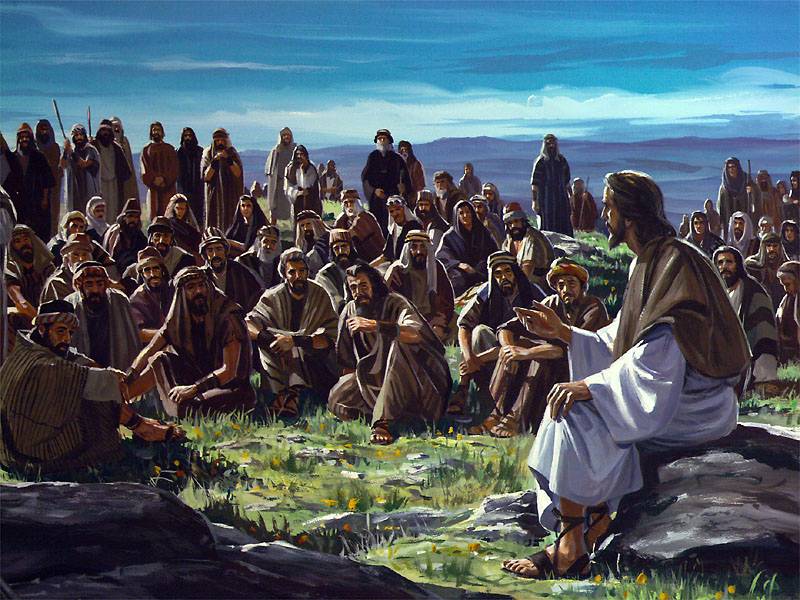
>What is the duties of an overseer and how does this explain who Jesus is?
* "Overseer" -Overseer here in Greek is "episkopos". (See episkope in verse 12, question 5 above for it's root.) The KJV translates this as Bishop. Traditionally this word is Bishop and/or Shepherd.
* Believers who watches over and take cares of others are also called overseers. 1 Timothy 3:1-7 states, "Here is a trustworthy saying: If anyone sets his heart on being an overseer, he desires a noble task. Now the overseer must be above reproach, the husband of but one wife, temperate, self-controlled, respectable, hospitable, able to teach, not given to drunkenness, not violent but gentle, not quarrelsome, not a lover of money. He must manage his own family well and see that his children obey him with proper respect. (If anyone does not know how to manage his own family, how can he take care of God's church?) He must not be a recent convert, or he may become conceited and fall under the same judgment as the devil. He must also have a good reputation with outsiders, so that he will not fall into disgrace and into the devil's trap." And Titus 1:5-9 states, "The reason I left you in Crete was that you might straighten out what was left unfinished and appoint elders in every town, as I directed you. An elder must be blameless, the husband of but one wife, a man whose children believe and are not open to the charge of being wild and disobedient. Since an overseer is entrusted with God's work, he must be blameless--not overbearing, not quick-tempered, not given to drunkenness, not violent, not pursuing dishonest gain. Rather he must be hospitable, one who loves what is good, who is self-controlled, upright, holy and disciplined. He must hold firmly to the trustworthy message as it has been taught, so that he can encourage others by sound doctrine and refute those who oppose it."
* Every congregation has appointed shepherds, pastors, overseers, and/or deacons. (Exodus 18:25; Acts 20:28; Philippians 1:1; and 1 Timothy 3; and 1 Peter 5:2) Though not all shepherds remain true to the Great Shepherd. (John 10:12-13) Jude 1:12-13 warns, "These men are blemishes at your love feasts, eating with you without the slightest qualm--shepherds who feed only themselves. They are clouds without rain, blown along by the wind; autumn trees, without fruit and uprooted--twice dead. They are wild waves of the sea, foaming up their shame; wandering stars, for whom blackest darkness has been reserved forever."
* For more about congregational elders see Acts 20:28-31; 1 Timothy 4:14, 5:17-20; Titus 1:5-9; and James 5:14. An overseer (traditionally bishop) is an equivalent word (from the Jewish background of Christianity) for "elder". The two words are used interchangeably in Acts 20:17, 28; Titus 1:5, 7; and 1 Peter 5:1-2. Deacons are similar to an elder. Overseers (elder) and deacons (see Acts 6:1-6) can be found in 1 Timothy 3 and Philippians 1:1.
>What can we then be sure about the outcome of our souls?
* "your souls" -Soul in Greek here is "psyche" and is very similar to the Hebrew words "nephesh", "ruwach", and "chay". Somewhat similar to the trinity of God, man has (or is capable of having) three parts; physical body, soul (feelings, will, and thought), and spirit (that which is of the spiritual world). When Adam and Eve sinned the first part that died was his spirit. Some would say a person does not have a soul; rather a person is a living soul. The Bible speak of the life of a soul (Proverbs 3:22). Every human soul (Acts 2:43; Romans 2:9) means each individual person. Biblically, the saying, "to save our souls" is seen in 1 Peter 3:20 meaning the entire person was saved when referring to Noah's family members.
God created Adam and Eve with a physical body, a soul, and a spirit. Physical bodies are chemical as plants and animals are, but angels usually are not. Souls (heart) are the nexus of thought, will, and emotion like animals and angels have, but plants do not. The spirit is the breath of God which angels are, but animals and plants are not. Mankind is unique in all creation in that we have a physical body, a soul, and a spirit. (Duet. 6:5, 10:12, 11:13, 30:6, Matthew 22:37, Mark 12:30, Luke 10:27)
* 3 John 1:2 "Dear friend, I pray that you may enjoy good health and that all may go well with you, even as your soul is getting along well."
* The Holy Spirit creates a new spirit in us, as Jesus taught Nicodemus (John 3). The new spirit is like an infant that grows when feed the word of God. (1 Corinthians 3:1-3; Hebrews 5:12-14; 1 Peter 2:2) Many of Jesus' parables teach that as we walk with God in truth and love the new spirit in us matures as we grows in Christ.
* Do you desire to see the well being of others' souls? Do you contribute to the congregation you are in so that others may mature in Christ?

|























